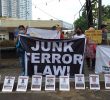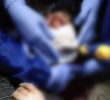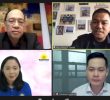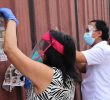DAVAO CITY, Philippines – Local and international groups raised the alarm as the Anti-Terrorism Act of 2020 was signed into law by President Rodrigo Duterte on Friday, July 3.
“This monstrous piece of legislation is, without any doubt, the final puzzle in Duterte’s delusions and its enactment into law has serious and far-reaching implications not only on our work as human rights defenders but also on the public who stands to be terrorized by this law,” said Cristina Palabay of human rights group Karapatan.
Duterte did not veto the bill despite strong and widespread opposition from various sectors, citing its “overbroad” definition of terrorism and “unconstitutional” provisions including warrantless arrest and longer days of detention.
On June 1, he certified the measure as “urgent” even when the country was still reeling from the rising cases of the new Coronavirus Disease (COVID-19) almost four months since the national government first imposed a lockdown. In one of his speeches last month, Duterte said terrorism is the number of threats in the Philippines.
“We will exhaust all means and platforms to challenge this Draconian law,” Karapatan noted.
Meanwhile, Amnesty International’s Asia-Pacific Regional Director Nicholas Bequelin, in a statement, warned that the law grants the government “excessive and unchecked powers”. He added that with such a “vague” definition of terrorism amid the prevailing climate of impunity in the country, it “can only worsen attacks against human rights defenders.”
“This law’s introduction is the latest example of the country’s ever-worsening human rights record. Once again, this shows why the UN should launch a formal investigation into ongoing widespread and systematic violations in the country,” Bequelin said.
On the same day, the Philippines breached the 40,000 mark of confirmed COVID-19 cases, among the highest in Asia.
Renato Reyes, secretary-general of Bagong Alyansang Makabayan, in his Facebook post, said that Duterte’s signing of the terror law shows that his administration “is more interested in suppressing dissent than in solving the health and economic crisis.” (davaotoday.com)










